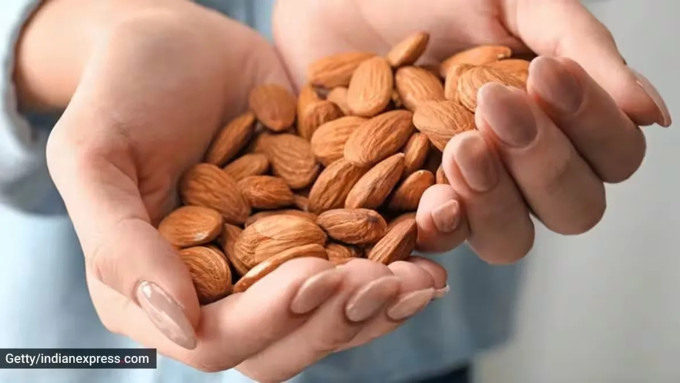Is curd made from coconut, groundnut, and almond milk healthier?
Forget cow or buffalo milk; have you ever tried curd made from coconut, almond, or groundnut milk? It’s not us, Ayurveda practitioner Guru Manish Ji believes that homemade curd made fromf coconut milk using the double boiler method is “much more beneficial” for your digestive health. “Similarly, you can have almond milk curd or groundnut milk curd,” he added.
Are such curds beneficial? We find out.

Being an ethical and environmentally conscious choice, plant-based or vegan curd contains no cholesterol, hormones, lactose, and additives as compared to dairy curd, said Silver Sethi, dietician and nutritionist, SCI Hospital (Golf Course Rd) & Six Sigma Clinic (Nirvana Courtyard). “Vegan curd includes equally healthy bacterial cultures that not only strengthen the gut but also improve overall immunity towards fighting infections and staying free of allergic reactions. Vegan curd also includes (more or less) similar nutrients as dairy curd like calcium, protein, fats, and B complex vitamins. The quantity and density may, however, vary,” said Sethi.
Agreed clinical dietitian Garima Goyal, adding that homemade curd using these plant-based milks can be made. She added:
Probiotics – Like traditional yoghurt, if these curds are fermented with probiotic cultures, they can support gut health by promoting beneficial bacteria.
Lactose-free – Suitable for those with lactose intolerance or dairy allergies.
Plant-based nutrients – Offers a variety of plant-based nutrients and can be included in vegan and vegetarian diets.
How to make these and what are their benefits?
Coconut milk curd
*Heat coconut milk using a double boiler until it is warm (not hot).
*Add a probiotic capsule or a small amount of existing dairy-free yogurt as a starter culture.
*Mix well and pour into a clean container.
*Cover and keep in a warm place for 8-12 hours or until it thickens.
Benefits
Rich in healthy fats – Contains medium-chain triglycerides (MCTs) that may aid in weight management and provide quick energy, Goyal said.
Vitamins and minerals – Contains vitamins C, E, B vitamins, and minerals like magnesium and potassium.
Antioxidants – May help reduce inflammation and support immune health.
Groundnut (peanut) milk curd
*Blend roasted peanuts with water to make peanut milk, strain it.
*Heat the peanut milk until it is warm.
*Add a starter culture (probiotic capsule or existing dairy-free yogurt).
*Mix well and pour into a clean container.
*Cover and keep in a warm place for 8-12 hours or until it thickens.
Benefits
Protein-rich – High in protein, which is essential for muscle repair and growth.
Healthy fats – Contains monounsaturated fats that can support heart health.
Nutrients – Provides vitamins E and B3, folate, and magnesium.
Almond Milk Curd
*Blend soaked almonds with water to make almond milk, strain it.
*Heat the almond milk until it is warm.
*Add a starter culture (probiotic capsule or existing dairy-free yogurt).
*Mix well and pour into a clean container.
*Cover and keep in a warm place for 8-12 hours or until it thickens.
*Ensure all utensils and containers are clean to avoid contamination. The resulting curds may vary in texture and tanginess compared to traditional dairy yogurt, but they can be a tasty and healthy alternative, said Goyal.
 Have you tried making almond milk curd? (Source: Getty Images/Thinkstock)
Have you tried making almond milk curd? (Source: Getty Images/Thinkstock)
Benefits
Low in calories – A good option for those looking to reduce calorie intake.
Rich in vitamins and minerals – Contains vitamin E, magnesium, calcium (if fortified), and healthy fats.
Antioxidants – Supports skin health and has anti-inflammatory properties.
Who should not have?
For most people, these homemade curds can be a healthy addition to the diet, but it is important to consider individual health conditions, allergies, and nutritional needs, said Goyal.
Allergies – People with allergies to tree nuts (such as almonds and coconuts) or peanuts should avoid these curds. Though less common, some individuals may be allergic to coconut.
Calories – Coconut milk, in particular, is higher in calories and fats, which might not be suitable for those on a strict caloric deficit, mentioned Goyal.
Infants and young children – They have specific nutritional needs that might not be fully met by plant-based milks alone. “They should not replace breast milk, formula, or cow’s milk (if not allergic) without proper nutritional guidance,” said Goyal.
View this post on Instagram
A post shared by Chatter Bites (@chatterbitespodcast)
Kidney issues – People with kidney problems may need to monitor their intake of certain minerals like potassium and phosphorus, which can be present in higher amounts in some plant-based milks, said Goyal.
Thyroid disorders – Almonds contain goitrogens, which can interfere with thyroid function if consumed in large amounts, particularly in those with existing thyroid issues.
Those with digestive sensitivities – Some individuals might find the fibre content in nut milks to cause digestive discomfort, such as bloating or gas, said Goyal.
Disclaimer: The copyright of this article belongs to the original author. Reposting this article is solely for the purpose of information dissemination and does not constitute any investment advice. If there is any infringement, please contact us immediately. We will make corrections or deletions as necessary. Thank you.
